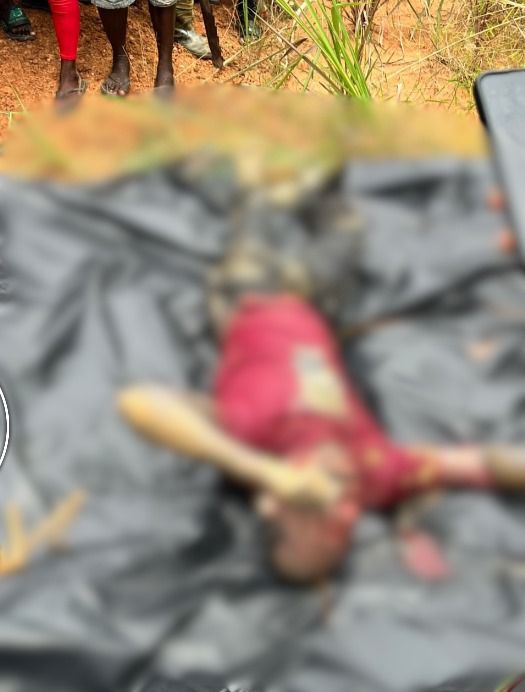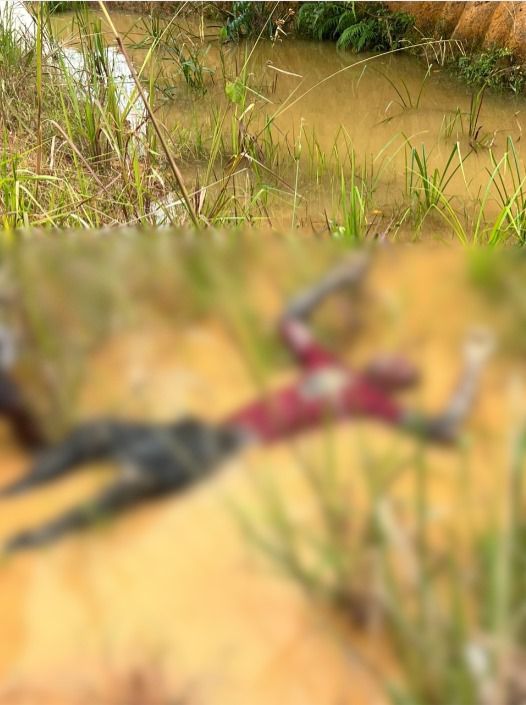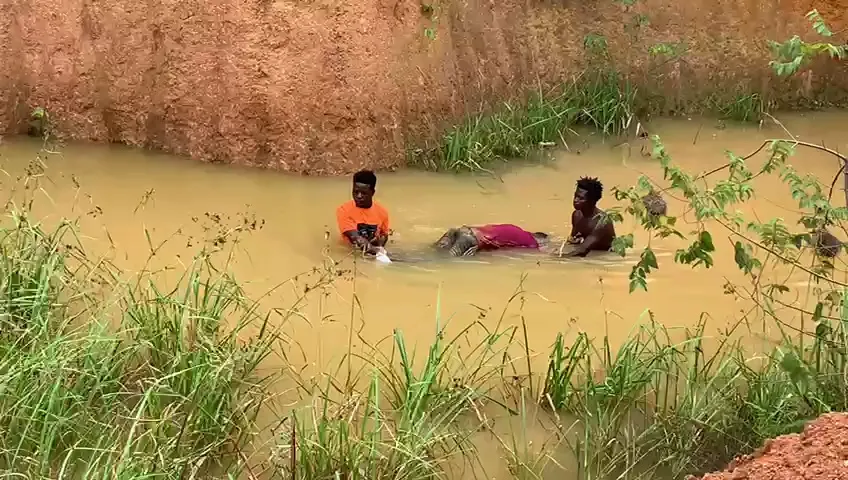Police in the Amansie West District of the Ashanti Region are investigating the mysterious death of a 28-year-old man, identified as Yaw Asamoah, whose body was discovered in an abandoned mining pit at Abrense near Atobease. The incident reportedly followed a heated altercation with a commercial sex worker over a missing sum of GH₵1,000.
The incident, which occurred on Monday, November 3, 2025, has sent shockwaves through the community, reigniting conversations about illegal mining hazards and the rising cases of violent crime in Ghana’s small towns.
Preliminary police reports and local eyewitness accounts suggest that the deceased had visited a woman alleged to be a sex worker in the area. Following their encounter, Asamoah is said to have accused her of stealing GH₵1,000 from him. The disagreement reportedly escalated into a confrontation, after which the young man went missing.
Residents launched a search after he failed to return home, only to discover his lifeless body the following day in an abandoned galamsey (illegal mining) pit.
The *Assembly Member for the Atobease Electoral Area, Mr. *Samuel Yeboah, confirmed the incident in an interview with Citi News, explaining that both the sex worker and a local caretaker had been detained by police for questioning.
“We just called the police to take the caretaker and the sex worker. Investigations are ongoing,” he said.
The deceased’s body has since been deposited at the morgue for autopsy as investigations continue.

The Amansie West District Police Command has launched a full-scale investigation into the matter to establish the cause of death and the circumstances surrounding Asamoah’s disappearance. Detectives are examining whether the death was accidental, a result of foul play, or linked to criminal negligence.
According to police sources, both suspects are cooperating with investigators. The authorities have not ruled out the possibility of additional arrests pending the outcome of forensic and autopsy reports.
While awaiting official confirmation, some residents claim that the deceased might have been assaulted before being dumped in the pit. Police have urged the public to refrain from speculation and allow investigations to proceed.
The tragic death of Yaw Asamoah draws attention to several pressing issues confronting Ghana’s rural and mining communities—namely, *illegal mining pits, **youth vulnerability, and *weak law enforcement in unregulated areas.
Across the Ashanti, Western, and Eastern Regions, abandoned mining sites have become death traps for unsuspecting residents. According to the *Minerals Commission, there are over *300 open and unrehabilitated mining pits scattered across Ghana, posing serious safety and environmental threats.
In 2024 alone, NADMO reported at least 15 accidental deaths linked to collapsed or open mining pits, particularly in Amansie, Obuasi, and Tarkwa. These sites are often left unsecured after illegal mining operations cease, turning into hazardous zones where drownings and falls are frequent.
Illegal Mining and Community Risks

The Amansie West District, known for its rich gold deposits, has long struggled with illegal mining—popularly known as galamsey. Despite several government crackdowns, including Operation Vanguard and Operation Halt, small-scale and unregulated mining activities continue to thrive, leaving behind numerous open pits and environmental degradation.
Residents have repeatedly appealed for reclamation of abandoned mine sites to prevent tragedies like this one. “These pits are everywhere. Sometimes people fall inside, especially at night. It’s dangerous,” lamented a local youth leader in Abrense.
The case also highlights the growing risks linked to commercial sex work in semi-urban and rural Ghanaian towns. Although sex work remains illegal under Ghana’s Criminal Code, it persists across mining areas, truck stops, and urban fringes—often associated with robbery, assault, and extortion.
Sociologists argue that unemployment and economic hardship are key drivers of the sex trade and related crimes. With the youth unemployment rate hovering around 14.7% (according to the Ghana Statistical Service, 2025), many young people in mining districts are turning to high-risk economic activities for survival.
Community leaders in Amansie West have since called for increased police presence, street lighting, and public education to improve safety and social order in the area.
Residents of Atobease and Abrense say they are deeply disturbed by the tragedy and have urged authorities to conduct a thorough probe. Some believe the death could have been prevented if security patrols and social interventions were stronger.
“We are living in fear. Every month there’s a new story—someone robbed, attacked, or killed. The authorities must act,” said one resident who requested anonymity.
Civil society groups advocating for community safety have also called on the Amansie West District Assembly to collaborate with the Minerals Commission and NADMO to reclaim abandoned mining sites and erect warning signs or fences around hazardous areas.

The Ashanti Regional Police Command has assured the public of transparency in handling the case. Autopsy results are expected to provide clarity on whether Yaw Asamoah’s death was due to drowning, injury, or other causes.
Authorities have also reminded residents to report criminal activity promptly and avoid taking the law into their own hands.
Meanwhile, social welfare officials are engaging the local community to sensitize residents on conflict resolution, personal safety, and the risks associated with illegal mining environments.
The death of Yaw Asamoah is a grim reminder of how multiple social issues—economic hardship, unregulated mining, and community safety gaps—intersect to create tragedy. As investigations continue, local authorities and policymakers face renewed pressure to close abandoned pits, strengthen rural policing, and tackle the root causes of crime and vulnerability in Ghana’s mining districts.
Until then, Amansie West joins a growing list of communities grappling with the human cost of neglect and economic desperation.
Read also: SLTF Cuts Student Loan Interest to 6% Simple Rate Under Mahama’s Education Reform Drive

